Jonathan Fanton, President of the MacArthur Foundation, and Philip Rosedale, CEO of Linden Lab, appeared in Second Life to talk about the future role of philanthropy in virtual worlds (also see Jonathan Fanton’s post.) The tireless crew of USC Center On Public Diplomacy (see my previous post for more on Anna Annenberg and Sitearm Madonna) did an amazing job of hosting this event that used four sims to bring so many people together (perhaps up to 250 at peak).
A recording of the event can be found at the MacArthur site for Digital Media and Learning here , a great post from Rik Riel here, and a call from Prokofky Neva for a new philanthropy here. But, the high point for me was the emphasis Jonathan Fanton put on Africa – developing access, connectivity, and bringing Second Life there.
In response to a question about using the combined energies of Linden Lab and The MacArthur Foundation to help Second Life to bring opportunities and training to communities in isolation – cutting out the middle man so to speak, Philip Linden said:
while they had nothing planned yet, this question was a fabulous example of the kind of barrier reduction that Second Life enables………cutting the costs of collaborating with people to close to zero sometimes.
And, Philip added:
I would love to work on ways, with the MacArthur foundation, to enable that.
Jonathan Fanton responded:
That question is a great example of what I hoped would come out of this conversation which is a series of concrete ideas that we could look at and develop into a program or two.
One of the challenges we face is being sure that places in the world that are remote, where people are desperately poor, that some of those people have access to the technology that enables them to come in and be part of Second Life. The MacArthur Foundation along with other foundations has a partnership for higher education in Africa working now in a dozen countries. One of the principle pieces of that initiative is to expand bandwidth at a lower cost and to get high quality internet connectivity through the continent of Africa.
Also, Jonathan Fanton described “being in the Google office and looking at the map of the world,” and :
how he remembered where inquiries were coming in ….and it is shocking to see that Africa was totally dark, just one or two places where Europe and the United States and places in Asia were bursting with activity. So, we have a real challenge in this world to get to the places where people most need us.
This project of developing high quality internet access and the opportunity to access virtual worlds like Second Life for all, especially people from remote and isolated communities, has been a prime motivation for much of my writing on Ugotrade.
The Magic of Second Life – talking one on one with Jonathan Fanton and Philip Linden
Both Philip Linden (above) and Jonathan Fanton stayed after the event to chat one on one with people (although Philip L. had to leave for the office fairly quickly).
I sent an IM to Jonathan Fanton about an African initiated Virtual Africa portal to Second Life (see next post!). And, I got an instant response. Not only did Jonathan Fanton himself want to stay in touch with project. He immediately sent contact information for the person most involved with Africa at The MacArthur Foundation.
“Africa Open For and In Business:” TED Global 2007
Soyapi Mumba writes about the mood at TED Global 2007 that convened in Arusha, Tanzania in early June:
everyone I met was determined to solve Africa’s problems without waiting for governments or donors. So I’ve come back energized and connected to the right community that will hopefully keep me motivated.
The picture above shows William Kamkwamba. His presentation was a highlight of TED Global 2007. Ethan Zuckerman who blogged every session of TED Global, and summarized in his post, “A New Wind Blowing In Africa.” Also, he noted the debut of William Kamkwamba’s Malawi’s Windmill Blog. William has begun blogging with the help of someone he met at TED.
Ethan Zuckerman writes about William:
He discovered a pair of books on energy, one of which included the design for a windmill, and he began work on a five meter tall windmill near his family’s home, built from scrap timber, an old bicycle frame, and blades made from PVC pipe heated and pounded into flat blades.
Innovators Meet On Second Life
William’s spirit of innovation and can do, will do, is the same kind of energy that has built Second Life. One of the points Philip Linden made again today at the MacArthur Foundation talk is one that is very relevant when considering Second Life’s potential in positive global development. Second Life hasn’t been built by corporations or institutions – it is ordinary people, with their boundless ingenuity, that have built the world’s first user generated metaverse, and its vibrant economy.
That is Satchmo Prototype (aka Chris Carella, Creative Director of The Electric Sheep Company) center in his low prim avatar for the always crowded Geek Meet. And, to his left is Robbie Kiama (from Lithuania) of Meta Mart (I am not sure who is typing?).
I hope one day I will meet William at one of Metaversed’s, now famous Friday Geek Meets on Second Life This week Cisco Systems’ Christian Renaud, Amazon Web Services Evangelist Jeff Barr, and Ogoglio’s Trevor Smith, all presented on The Future of the 3D Web, and fielded challenging questions from a large group of Second Lifers.
Or, perhaps, William and countless other African innovators would be interested in the Wikitecture project on Architecture Island. This week Clear Ink’s Keystone Bouchard, (aka Jon Brouchoud) gave a Wikitecture demnstration on Architecture Island on Second Life.
Clear Ink tried to make arrangements to stream TED Global into Second Life, but logistical obstacles held sway. Clear Ink did stream the spring TED 2007 conference into their Allston sim HERE (SLurl). And, Cameron Sinclair, 2006 TED Prize winner, Executive Director of Architecture for Humanity, co-editor of the book ‘Design Like You Give A Damn‘ and contributing writer for Worldchanging.com was joined by Sun Microsystems founder John Gage in a live audio discussion in Second Life.
“Its a great time to be a reader of African blogs.”
Ethan Zuckerman also notes:
William’s not the only new African blogger to appear on the web this week. Ike Anya and Chikwe Ihekweazu have both leaped onto the scene with their new blog, Nigeria Health Watch, which looks at public health issues and innovations in Africa’s most populous nation. Welcome, guys. It’s a great time to be a reader of African blogs – if you’re not getting your daily dose, take a spin by BlogAfrica, Afrigator or Global Voices and make sure you’re getting your recommended daily allowance of African innovation.
There are some really great roundups now of the TED Global 2007. There is an awesome look at the blogging of TED Global here from Benin Mwangi. His post for Global Voices is packed full of excerpts from a huge storehouse of insightful writing that came out around the conference. Benin Mwangi notes that Jen Brea’s site (she is also a Global Voices author), Africabeat, describes an overall feeling that she found emanating from attendees at TED 2007 — that the time has come for the continent to write her own story.
Also, you can find some of the following bloggers first thoughts from home here. This is just some of the bloggers that wrote about TED Global.
Afromusing, Bankalele, Mentalacrobatics, Ethan Zuckerman, Mweshi, Afrigadget/White African, Africa: The Next Chapter.
“Put Africa Back In The Computer”
Afrrican Path writes up the presentation of Kwabena Boahen at TED Global. Boahen is researching “Why aren’t we seeing computers challenge the brain?” He is looking at ways to overcome the obstacles to Alan Turing’s 1946 prediction, “In 30 years, it would be as easy to ask a computer a question as to ask a person.†(Also see Extropia DaSilva’s interesting essay on Mitch Kapor’s (angel benefactor of Linden Lab in the early days) “bet centered on a question: Will the Turing Test be passed by a machine by 2029? Ray Kurzweil said ‘yes’, Kapor said ‘No’ and whoever loses will donate $20,000 to a charity selected by the winner.”
Afrrican Path writes:
Why is the brain so much more efficient, using a hundred thousand times less energy than a computer? Boahen believes it’s all in the wiring. Computers put all data through a central bottleneck, either a CPU or an I/O processor. Brains, on the other hand, are networks – each neuron connects to hundreds of other neurons, and there is no central bottleneck. Computers are serial, rigid, while the brain is parallel, fluid. Or as Brian Eno said in 1995, “The problem with computers is that there is not enough Africa in them.”
Ethan Zuckerman noted:
Boahen’s presentation ended with a picture of a steel drum – what happens when you put Africa in the piano.
Boahen’s goal is to put Africa in the computer, generating thought, creativity and dynamism. It’s likely a long road from the artificial retina to an African computer, but Boahen is walking that road.
Tags: Second Life | MacArthur Foundation | Philanthropy | Virtual Worlds | Web 2.0 | We 3.D | Jonathan Fanton | Philip Rosedale | Linden Lab | digital divide | TED Global 2007 | TED 2007 | TED Global | Africa | Virtual Africa | Google | Philip Linden | African blogs | African bloggers | Turing Test | Kwabena Boahen | African Computer | World 2.o | African innovation | sutainable development | wikitecture | Geek meet | internet access | connectivity | positive global development | virtual worlds | virtual reality | metaverse |

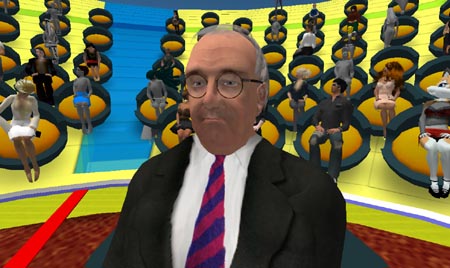
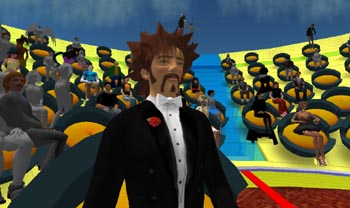
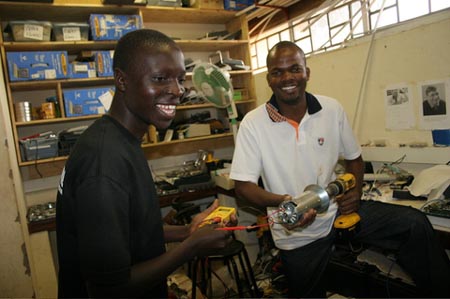

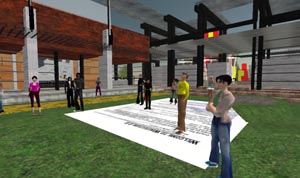
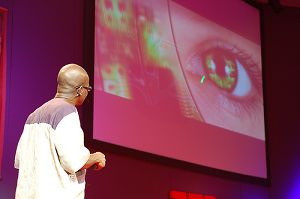
June 24th, 2007 at 11:22 pm
If you want to read what teens in SL had to say during the MacArthur Philanthropy event you can read our blog post about it here: http://www.holymeatballs.org/2007/06/sl_locations_for_the_philip_li.html
A comment from one teen in particular summed up the effect the event had on many who participated. “After hearing the conversation Phillip had today, I just feel like I want to be part of something to help mankind.”